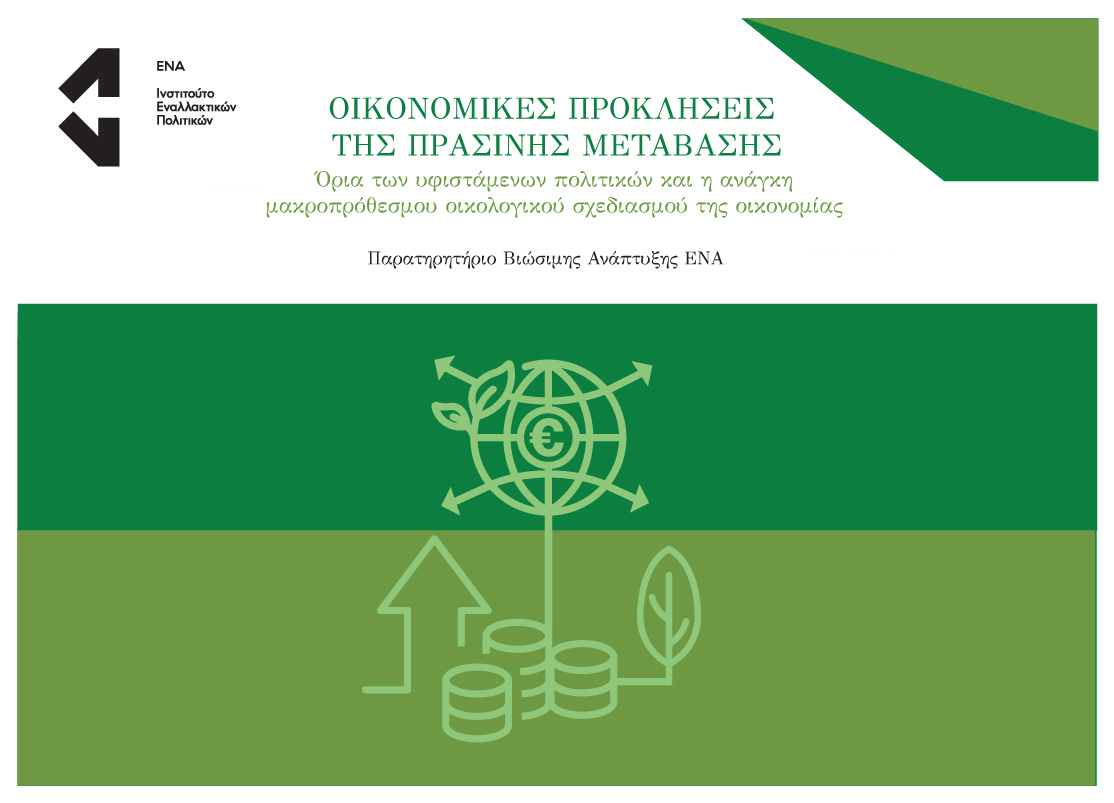Economic Challenges of the Green Transition
Special Feature Editors: Yannis Eustathopoulos, Antigoni Voulgaraki
July 2023
Special Feature of the Sustainable Development Observatory - ENA InstituteENA’s Sustainable Development Observatory contributes with a special feature to the public debate taking place at the European level on the economic challenges of the green transition, while attempting to answer a number of critical questions:
- “Green Deal Industrial Plan”, “Net-Zero Industry Act”, enlargement of the EU’s “Emissions Trading Scheme”, “New Strategy for Sustainable Finance”: Europe is multiplying initiatives to accelerate the green transition in the economy and the corporate sector. What are the objectives of these policies and what changes will they drive in the economy, business and employment?
- In particular, how is the ‘investment gap’, which is emerging as a central issue of the green transition in Europe and the world, to be addressed? To what extent can the state fill this gap in a period of fiscal and monetary policy retrenchment? How can a fair and sustainable distribution of the costs of the transition between the state, businesses, regions and households be ensured?
- Can Greece and the countries of Southern Europe cope with the challenges and opportunities arising from the climate transition or will European policies on the contrary further increase intra-European inequalities? Do lower income groups and small and medium-sized enterprises have equal opportunities to participate in the green transition? How can climate inequalities be addressed?
- What are the different approaches to the role of the state and economic policy in supporting the green transition? Is it reasonable to hope that the green transition can rely solely on market mechanisms (carbon pricing, investment incentives, etc.) to initiate timely, adequate and socially just transformations that reverse decades of embedded production and consumption patterns? What role can long-term sustainable development planning, green industrial policy and public development agencies play? What are the findings of research on the effectiveness of the various approaches and their overall distributional socioeconomic and regional impacts?
The working paper by ENA Research Associate, Antigoni Voulgaraki, on “Energy and Green Transition in Europe and the Challenge of Finding Resources” presents recent EU legislative initiatives for the development of green technologies and the greening of industry, focusing on the Green Deal Industrial Plan. In this context, it examines critical aspects of the European authorities’ approach to the funding gap for these policies and, in particular, for those countries with limited budgetary and investment capacities, such as Greece, which question their ability to address the various challenges and growth opportunities of the green transition. In the same direction, New Economics Foundation Senior Policy Officer, Sebastian Mang, presents in an interview with ENA the conclusions and recommendations of his report on Green Industrial Policy in the EU. The NEF researcher explains the essential differences between EU and US policy in the field of green industrial policy, makes proposals for upgrading industrial policy in Europe with a focus on its environmental and social impact, and points out the need to redesign macroeconomic and industrial policy in the EU so that the member states of the European periphery participate on an equal footing in the relevant policies. ENA’s research associate Elena Dima, presents in her working paper “Integrating Sustainability into the Financial Policy of the EU through Regulatory and Accounting Frameworks” the complex EU Sustainable Finance framework and the numerous profound changes it will entail in the functioning of businesses, the financial sector and fiscal policy authorities. These changes affect both the way European businesses operate, which are required to integrate the EU’s green transition objectives in a much more structured and rigorous way, and financial actors, who are required to direct their resources towards green investments according to strict criteria and standards. This framework also introduces significant changes in the design and implementation of fiscal and monetary policy. Following the ENA workshop on the new EU ESG framework, the document offers a synthesised and comprehensive overview of these complex and important policies that aspire to change business and the economy in Europe. In an interview, Economist Olivier Vardakoulias (CAN Europe) answers all the questions of the special, drawing on his long professional and scientific experience at European level on climate and environmental issues, and conveys the work and views expressed in the European public sphere regarding a number of critical aspects of the green transition. In this context, issues such as the division of roles and responsibilities between state and market, the bridging of the investment gap and the overall perspectives and proposals for accelerating a just green transition in Greece are addressed. Finally, the study by Yannis Eustathopoulos, Coordinator of the Sustainable Development Observatory, “Objectives, priorities and policies of the energy transition in Europe and Greece”, which opened the discussion in 2022, provides a critical analysis of the dominant international approaches and policy proposals for supporting the green transition, which over-rely on market-based tools such as carbon pricing (e.g., carbon tax, emissions trading schemes) and sustainable financing (e.g., green bonds). In this context, a set of policy alternatives is presented that integrate carbon taxation and sustainable finance into a holistic approach to green economic policy, which assigns a primary role to long-term public development planning and the use of a broader instruments and actors.
Full text in Greek of the Special Feature